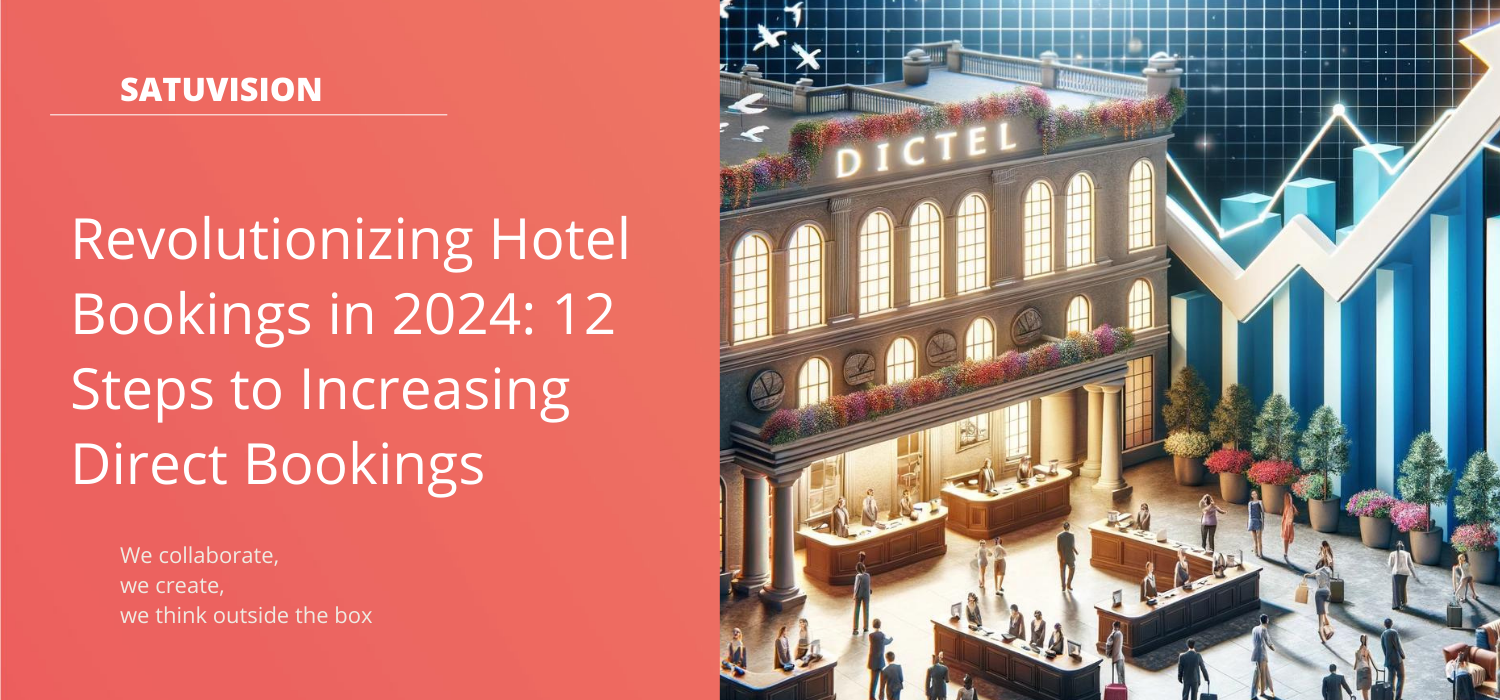Welcome to 2024, a dynamic year for the hospitality industry. As hoteliers, we are always looking for ways to boost direct bookings. This comprehensive guide will unveil twelve innovative strategies on how to increase direct bookings for hotels. By the end of this article, you’ll be able to enhance your hotel’s appeal and draw guests directly to your doorstep.
Table of Contents
What is Direct Booking?
Direct booking refers to the process where customers reserve their hotel stays directly through the hotel’s own website rather than through third-party online travel agencies (OTAs). Hotels are really digging this approach. Why? It’s more cost-effective and super convenient. They dodge those hefty OTA fees and get to offer you nifty loyalty rewards.
Plus, with direct booking, you can use all the great data from your guests to make their stay even better. Your hotel website will also work as the hotel’s digital welcome mat, full of vibrant photos and cool videos that give you a sneak peek of your upcoming stay.
Current Trends and Technology in Direct Booking
The landscape of hotel bookings has seen a consistent tug-of-war between OTA and direct bookings. Hotels are kind of tired of paying big commissions to those third-party websites, so they’re getting savvy with tech like website builders and booking engines.
Statistical data from a Skift Research Report indicates that 64% of hotels globally currently use booking engines. Additionally, 45% of hotels (60% of the global room supply) are utilizing website builders and direct booking tools. These technologies are not just in high demand but also hold significant growth potential.
A survey by Hotel Tech Report revealed that direct booking apps are among the top tech categories in which hoteliers love to invest. The growth in this sector is rapidly amazing. So, we need to find the right mix of technology and marketing strategies to ensure a memorable experience for your guests.
Processing Direct Bookings at Hotels

Hotels effectively manage direct bookings through several key channels, each catering to different guest preferences and situations:
- Online Bookings via the Hotel’s Website: Guests select dates and room types before paying through the website’s integrated booking engine. The data is synced to the hotel’s Property Management System.
- Bookings via Phone and Email: Staff manually input reservations from phone or email into the PMS and process payments using secure methods.
- Walk-in Bookings: Front desk staff handle on-the-spot bookings for walk-in guests, managing the reservation and payment process immediately.
How to increase direct bookings for hotels: A complete 12 steps explanation
Boosting direct bookings is key to your hotel’s success. We’ve put together a 12-step guide to help you out. These steps cover everything from tech upgrades to guest experience enhancements, giving you practical tips to attract more direct bookings. Up next, we’ll dive into each step, showing you how to turn potential guests into direct bookers and improve your hotel’s performance.
1. Make Your Website a Welcoming Lobby
Your website is often the first impression potential guests have of your hotel. Ensure it’s visually appealing, with high-quality images of rooms and facilities. Simplify the booking process – fewer clicks mean higher conversion rates.
Remember, your website should reflect the ambiance and experience of your hotel, persuading guests to book directly.
Here’s the list of the tools that you can use:
- Website Builders and CMS Platforms: WordPress, Squarespace, or Magento
- SEO Tools: Google Search Console, SEMrush, or Ahrefs
- Content Management Tools: WordPress, HubSpot CMS Hub, or Joomla
- Image and Video Editing Software: Adobe Photoshop or Canva for images, Adobe Premiere Pro or iMovie for editing video.
- User Experience (UX) Design Tools: Figma or Hotjar for heatmaps
- Booking Engine Software: OmniHotelier, BookandLink
- Website Speed Optimization Tools: Google PageSpeed Insights
- Responsive Design Checkers: BrowserStack or Google’s Mobile-Friendly Test.
- SSL Certificate Providers: Let’s Encrypt or VeriSign (Mostly preinstalled on your Host)
- Live Chat Feature: WhatsApp, LiveChat, or Zendesk Chat.
FREE RESOURCES: Hotel Website UI/UX Checklist Elevating Experiences
2. Social Media: Your Hotel’s Digital Handshake
Social media goes beyond just posting pictures. It’s about creating a community. Engage with your audience through interactive posts, respond to comments, and utilize targeted ads to transform your followers into guests. Show off your hotel’s personality and what makes it unique.
You can use Hootsuite or Buffer for social media management, Canva for creating engaging visuals, and Facebook Ads Manager for targeted advertising campaigns.
Read More: Social Media Marketing Strategy to Increase Booking Rates (2024)
3. Email Marketing: Like Sending a Postcard to Each Guest
Segment your email list to send more targeted messages. For example, send personalized offers to repeat guests and welcome messages to first-time bookers. Include compelling calls-to-action (CTAs) in your emails, encouraging recipients to book directly for the best deals.
Learn to use these tools and see their benefits in no time; Mailchimp or Constant Contact is used for email campaigns, Segment is used for audience segmentation, and Canva is used for visually appealing email designs.
4. SEO: Helping Guests Find Their Way to You
Invest in keyword research to understand what potential guests are searching for. Include these keywords in your website’s content, meta titles, and descriptions. Regularly update your blog with engaging, SEO-friendly content about travel tips, local attractions, and hotel news.
You can use SEMrush or Ahrefs for SEO and keyword research, Moz for SEO insights, and Google My Business for local SEO enhancement.
5. AI: Personalizing the Guest Experience
From the booking process to the moment they check out, personalization can make a memorable difference for your guests. Adjust your communication, offer room preferences, and consider personalized greetings. Small gestures can lead to big returns in guest loyalty.
Use data from previous stays to offer personalized room settings or amenities. Develop a guest portal on your website where guests can customize their upcoming stay, enhancing their overall experience and satisfaction.
Tools that you can use: Salesforce or HubSpot for CRM, PMS (Property Management System) for guest data management, and Tailwind or FOMO for personalized marketing.
6. AI Chatbots: a Concierge for Each Guest
AI and chatbots are revolutionizing guest service. From answering queries to handling bookings, these tools provide 24/7 assistance, making the booking process seamless and efficient. Use Dialogflow or IBM Watson for AI chatbots, Zendesk Chat for customer service, and PMS systems with AI capabilities for personalized guest experiences.

7. Reward Programs: More than Just Points
Reward programs are a fantastic way to build loyalty and encourage repeat business. Think beyond just points; offer unique experiences, early check-in options, or special event invitations. This personal touch can turn a one-time guest into a lifelong fan.
HubSpot is well-known for tracking customer interactions and preferences. You can also use LoyaltyLion or Smile.io to create engaging reward programs.
8. Listen and Learn: The Guest Feedback Loop
Actively seeking and responding to guest feedback shows that you value their opinions and are committed to improving. Use this feedback to refine your services, making each stay better than the last.
For gathering feedback, SurveyMonkey or Google Forms are the best choices. You can also use TripAdvisor to monitor reviews and Zendesk to manage customer interactions.
9. Teaming Up with Local Partners
Collaborate with local businesses to create unique guest experiences. Whether it’s a tour with a local guide, a meal at a popular restaurant, or tickets to a show, these partnerships enrich your guests’ stays and promote community businesses.
Tools: Eventbrite for event collaboration, Google Sheets for managing partnerships, and Canva for creating co-branded marketing materials.
10. The Power of Networking in the Hospitality World
Networking is key in the hospitality industry. Attend local business events, join hospitality associations, and participate in online forums. These connections can provide valuable insights, partnership opportunities, and referrals.
Use LinkedIn for online networking, Meetup for finding local events, and Eventbrite for industry gatherings and seminars.

11. The Numbers Game: Making Data Your Ally
Data is your secret weapon for understanding your market and guests. Analyze booking trends, website traffic, and guest feedback to make informed decisions that enhance your services and marketing strategies.
Tools you can use: Google Analytics for website data, Tableau for data visualization, and a PMS (Property Management System) for tracking booking trends.
12. Keeping Up with the Travelers of Today
Today’s travelers are looking for unique, authentic experiences. Stay up-to-date with current trends, such as sustainability, local experiences, and tech-savvy amenities. Adapting to these trends can set you apart and make your hotel more attractive to modern travelers.
Check Skift for travel trends, Google Trends for staying current, and a PMS with sustainability tracking features.
Read More: Crafting Memorable Guest Experiences and Reputation Management for Hotels in Bali
Direct Booking is Beneficial for Hotel Businesses in 2024
Direct booking is becoming more and more vital for hotels every year. The rising trend, highlighted by Phocuswright’s report, shows that by 2023, hotel direct bookings were expected to surpass OTAs, signifying a major shift in the industry.
In 2021, the direct booking channel experienced significant growth, driven by hotel campaigns, loyalty program incentives, and a growing preference among travelers for direct contact with hotels. This surge, with an 80% rise, indicates a strong preference for direct bookings over OTAs, forecasted to continue into this year.
In the face of OTAs’ dominance in previous years, the pendulum is swinging back towards direct bookings. This shift benefits hotels in several ways:
- Cost Efficiency: Avoiding the high commissions charged by OTAs, hotels save significantly on each booking.
- Customer Relationship: Direct bookings foster a closer relationship with guests, allowing for personalized services and better understanding of customer preferences.
- Data Insights: Direct interaction with guests provides valuable data for enhancing the guest experience and tailoring marketing efforts.
- Brand Loyalty: Direct bookings encourage repeat business through loyalty programs and tailored offers.
As we move into 2024, embracing direct booking strategies seems increasingly advantageous for hotel businesses. It offers a more sustainable model, balancing profitability with enhanced guest experiences and brand loyalty.
Conclusion
In 2024, success in the hospitality industry hinges on innovation and adaptability. By implementing these twelve strategies, from enhancing your online presence to forging local partnerships, you’re well on your way to increasing direct bookings and delighting guests.
Remember, the right tools and a keen understanding of modern traveler trends are your allies in this journey. With these in hand, your hotel is set to thrive in an ever-evolving landscape.
Frequently Asked Questions
Hotels prefer direct bookings to:
-
- Avoid paying commission fees to online travel agencies (OTAs).
-
- Build direct relationships with guests for personalized service.
-
- Maintain control over their branding and offerings.
-
- Offer flexible terms and loyalty program benefits.
-
- Collect valuable guest data.
-
- Enjoy higher profit margins due to reduced costs.
Direct booking is when you reserve accommodations or services directly with the provider, like booking a hotel room through the hotel’s website. Indirect booking involves using third-party platforms or intermediaries, such as online travel agencies (OTAs) like Expedia, to make the reservation.
It’s not easy, but by adopting these strategies, you’re ensuring your hotel remains a top choice for travelers in 2024 and beyond. Reach out to SATUVISION today, and let’s turn your hotel into the go-to destination for travelers. With our expertise in digital marketing and hospitality, we’re here to guide you every step of the way!




